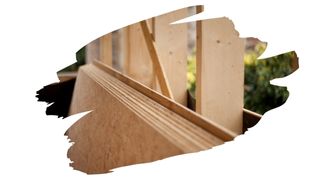Plywood is affordable, easy to work with, and surprisingly strong. And, if you can get your hands on exterior-graded plywood, it can hold up well outside too.
But, while exterior graded plywoods adhesive can hold up well against moisture, those compressed wood chips may not.
This is why you need to seal exterior plywood if you plan on using it for outdoor structures. But, is Spar Urethane enough to safeguard plywood from all-weather?
Well, in this post you’ll find out why Spar Urethane is such a fantastic weatherproof finish. And keep reading to discover why pressure treatment alone isn’t enough to protect plywood from weathering and decay.

This post may contain affiliate links to products that we receive a commission for (at no additional cost to you). Learn more here.
Does Plywood Really Need Sealing?
It absolutely does, especially if it is to be used outside.
The fact of the matter is, plywood isn’t rot-resistant or water-resistant. Instead, it’s simply a manufactured wood composite made up of natural wood shavings and glue.
Even exterior graded plywood is only graded as such, because the glue used to make it’s water-resistant. Yet, that does not mean that its individual plies are just as water-resistant.
So if exterior graded plywood is left unsealed, it can succumb to rot and decay.
Related Post: What’s The Best Type Of Finish For A Plywood Workbench Top?
What About Pressure Treated Plywood? Does That Need Sealing Too?
Well, pressure treated plywood is more rot-resistant than untreated plywood. And that’s because this material is infused with anti-bacterial chemicals that fight off wood rot.
However, it does not make plywood water-resistant. It simply makes it less likely to decay.
But, pressure treatment chemicals alone aren’t going to be able to do much to protect outdoor plywood. Especially if unsealed plywood is regularly exposed to highly humid surroundings.
On top of that, pressure treatment is more of a surface level treatment when it comes to plywood. Thanks to multiple layers of ply, its hard for the chemical treatment to completely saturate plywood.
So, only the outermost layers of plywood get the full chemical treatment. The interior ply layers get very little. Making it doubly as important for you to seal up that pressure treated plywood sheet.
Related Post: What Is The Best Plywood For Outdoor Use? (Solved!)
OK. So How Do I Do That? What Can You Use To Protect Plywood For Outdoor Use?
Simply use a waterproofing exterior wood sealant. However, when it comes to the great outdoors, you ideally should also use one that has additional weatherproofing ingredients.
And one of the best ones you can use is Spar Urethane. This urethane-based wood sealer is so water-resistant, its widely used to seal boat decking and outdoor garden furniture.
On top of that, Spar Urethane finishes often come with mildew-resistant additives and UV-blockers — providing extra weatherproofing.
How Do You Seal Plywood Without Worrying About Spar Urethane Yellowing Over Time? Use a clear water-based Spar Urethane product. Oil-based Spar Urethane are the ones that tend to yellow as they age. But, water-based ones do not.
And How Exactly Do I Seal Plywood Up Properly?
You can learn more about how to seal plywood by checking out our post right here on The Woodwork Place: Beginners Guide To Plywood Sealer (What You Need To Know)
In that post we explain what types of other wood sealants are suitable for plywood. You’ll also learn exactly how to seal over those tricky exposed plywood edges.
But Is Spar Urethane Really That Much Stronger Than Regular Polyurethane?
While they are both urethane-based wood sealers, Spar Urethane is more durable — not necessarily stronger.
The balance of ingredients in Spar Urethane is distinctly different from that of typical interior polyurethanes. And that ingredient balance allows Spar Urethane to be more flexible than your typical interior polyurethane finish.
With this added flexibility, Spar Urethane is better at shrugging off scratches and scrapes.
Related Post: Can You Use Spar Urethane Sealer On Outdoor Pine Wood?
To Wrap Up, Here Are The 3 Key Takeaways From This Post…
- 1). Plywood, (even exterior graded plywood), will need a water-resistant wood sealant if it’s to be used outside.
- 2). Pressure treated plywood is more rot-resistant, but it is not water-resistant. So, it too, will need an exterior wood sealer.
- 3). Spar Urethane is a water-resistant, mold-resistant, and even UV-resistant wood sealer. It can be used to seal boat decking, garden furniture, and of course, plywood.



